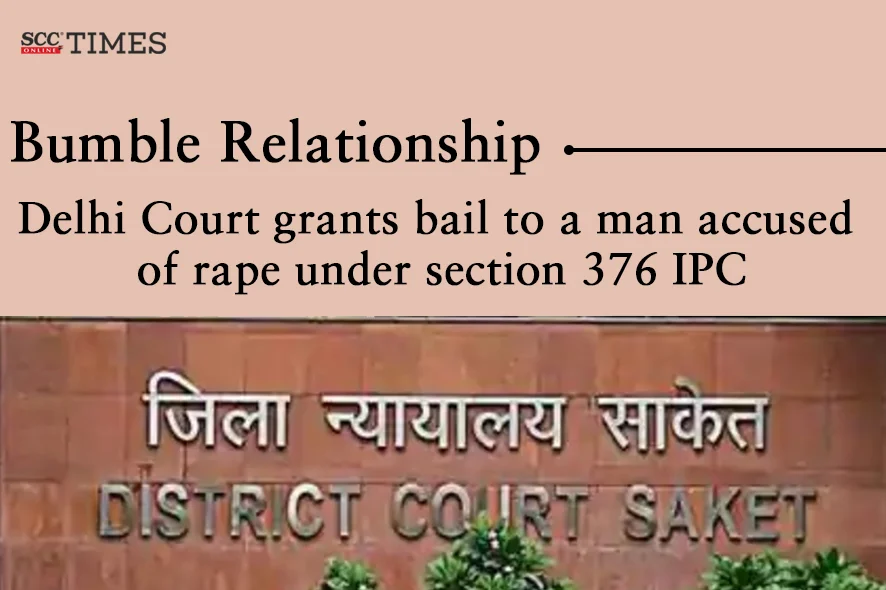Saket Court, Delhi: A bail application was filed by the accused who stood charged under Sections 376, 377, 506, and 34 of the Penal Code, 1860 (IPC) wherein the applicant had met the complainant through a dating app Bumble. Sunil Gupta, J., granted bail to the accused, considering various factors, including the completion of the investigation and the accused’s conduct during interim bail. It also imposed conditions encompassing the posting of a bail bond, regular court appearances, prohibition of contact with the complainant or her family, mandatory notification of address changes, and restrictions on international travel.
The case at hand involves allegations against the accused stemming from his involvement with the complainant, which began through the dating app Bumble. FIR was filed under Sections 376, 377, 506 and 34 of the Penal Code (IPC) and the accused was arrested on 16-12-2023. The accused was released on interim bail on 08-01-2024, first to attend his sister’s wedding, which was later extended until 21-02-2024.
The defense fervently advocated for the grant of bail, citing the completion of the investigation and the accused’s unwavering commitment to adhere to any conditions laid down by the court. Legal precedents were invoked to support the defense’s stance. Conversely, the prosecution vehemently opposed the bail application, citing the gravity of the charges and the potential repercussions on the trial process.
Counsel for the complainant also contributed to the discourse, expressing difficulties in presenting arguments due to the alleged unavailability of crucial documents, including the bail application and the charge sheet. However, the defense countered this assertion by highlighting instances where the complainant’s counsel had previously reviewed the bail application during court proceedings.
The Court addressed the complainant’s counsel’s claim of not receiving vital documents, emphasizing instances where the counsel had the opportunity to peruse the bail application. The Court examined the legal principles governing bail applications, considered factors such as the investigation’s completion, the severity of the charges, and the accused’s behavior during interim bail and remarked that “merely because the accused was out on interim bail does not entitle him to be released on regular bail still considering the facts and circumstances along with the valuable right to life and liberty of the applicant and the fact that there was no apprehension of the prosecution or the complainant that the applicant can influence/intimidate the witnesses, it will not be in the interest of justice to send the applicant in custody again. The submission of complainant to the effect that the applicant has not married her despite assurances given by his relatives at the time of hearing of his interim bail application on 08-01-2024 cannot be taken into consideration while disposing the present application.”
The Court granted bail to the accused on furnishing of bail bond for a sum of Rs. 1 lakh with two sound sureties in the like amount to the satisfaction of the Magistrate, however, to ensure compliance and safeguard the integrity of the trial process, imposed the following conditions
-
He shall regularly appear before the Court on each date.
-
He shall not contact the complainant/her family members in any manner whatsoever.
-
He shall intimate the Court in case of change of his address.
-
He shall not go out of the country without permission of the Court.
[State v. Gautam Kumar, 2024 SCC OnLine Dis Crt (Del) 1, decided on 21-02-2024]
Advocates who appeared in this case :
Sh. Santosh Kumar, Ld. Addl. PP for the State
Sh. Namit Saxena, Counsel for the applicant along with applicant







